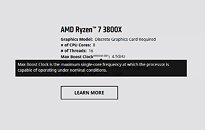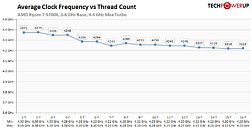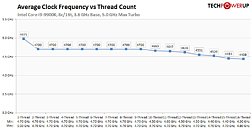Monday, August 12th 2019

AMD Updates Ryzen Product Pages to Elaborate on "Max Boost Clocks"
AMD over the weekend updated the product-pages of its Ryzen processors on the company website to be very specific about what they mean by "Max Boost Clocks," that are advertised almost as extensively as the processor's main nominal clock-speeds. AMD describes it has "the maximum single-core frequency at which the processor is capable of operating under nominal conditions." We read into this as the highest boost-clock given to one of the cores on the processor.
If you've been reading the "clock-frequency and boost analysis" charts in our processor reviews, you'll know that AMD processors spread their boost frequency progressively across cores during a multi-threaded workload that scales across all cores. At any given time, only one of the cores is awarded the highest boost clock, and while the other cores too get boosted beyond the nominal clock-speeds, they are in slight decrements of 25-50 MHz. The graph below is from our Ryzen 7 3700X review. The second graph below is from our Core i9-9900K review, which too shows only one of the cores getting the max boost frequency, and the remaining cores getting lower boost clocks, although the graph looks flatter.
Source:
squidz0rz (Reddit)
If you've been reading the "clock-frequency and boost analysis" charts in our processor reviews, you'll know that AMD processors spread their boost frequency progressively across cores during a multi-threaded workload that scales across all cores. At any given time, only one of the cores is awarded the highest boost clock, and while the other cores too get boosted beyond the nominal clock-speeds, they are in slight decrements of 25-50 MHz. The graph below is from our Ryzen 7 3700X review. The second graph below is from our Core i9-9900K review, which too shows only one of the cores getting the max boost frequency, and the remaining cores getting lower boost clocks, although the graph looks flatter.



134 Comments on AMD Updates Ryzen Product Pages to Elaborate on "Max Boost Clocks"
Because of clever clocking (or whatever reason), the new Ryzens seem to have like no headroom at all and in the absence of a clear definition of what boost means, we're left scratching our heads because it seems neither impressions nor experience apply anymore.
Edit: I am having issues. I accidentally did something to hwinfo to make it only show the clock multiplier, not the clockspeed. When I open superpi it just sits there saying analyzing devices.
4.4GHz is the max I see otherwise.
Not bitter, I just feel like I wasted money compared to if I'd gotten a 3700X.
The lack of acknowledgement of this issue from AMD is what bugs me.
That said, the lawyer in me also knows exactly what's coming - I mean, AMD made a bit of a blunder here. Lots of people still are fooled though; class action lawsuits accomplish exactly zero aside from generously lining the pockets of participating law firms. It'll be amusing to see the reactions of the vengeful "AMD has betrayed my trust" type as they realize that they don't actually stand to gain anything from the legal proceedings.
I suppose that AMD wanted to soften enthusiasts' ego damage upon seeing the clock speed hit from crossing 10nm, but even the advertised clocks are not that high. If they had just advertised a conservative 4200MHz for the 3700X for example, and touted efficiency a bit more and "just wait for the reviews, you'll see how good it is", they would have been just fine. Ryzen 3000 speaks for itself really; actually marginally better IPC than Intel at sane power and temperatures, so the 9900K's 5GHz boasting would still be smoke and mirrors.
Intel will have to go through the same "clock shock" when it gets down below 10nm, so I don't see what the big deal is.
Look, as I keep saying, I'm not upset with the performance, what bugs me is the fact that I paid extra for something that doesn't deliver what it says on the tin. In fact, I seemingly paid more for something that performs less, as there are 3700X chips that outperform my 3800X in benchmarks.
As far as my system goes, it's quiet, it runs cool (if you don't consider that the chipset hits 80C+ at times) and it's powerful, it's just not what I apparently paid for when it comes to the CPU.
Some people aren't having any issues, so there's nothing to complain about, but quite a lot of people are, so AMD needs to step up and explain what's going on and then do something about it.
Tried disabling PBO (instead of the default auto), had not effect. Tried using offset. First -0.1, didn't boot. Tried-0,5 and then I saw something very wierd.
The idling voltages are still 1.46ish. Frequency is down to 4.25, which also is my max all singlecore boost. Down from 4.275.
The wierd thing is that when I load up CB20, I get 1.26v and 3.95-3.975 on all cores (old was 3.9). So by setting a negative voltage I've -increased- my all core voltage and clock.
Whats even more wierd is that temperatures went down on the CB run. 60C. Which doesn't make sense at all since both frequency and voltages are higher..
Something isn't right at all. Early adopter issues hopefully. Luckily it's stable, so I don't mind waiting for some amd finewine bios/driver update. Atleast the -0.5 voltage lowered temps alot, so the fan isn't spooling up and down so much.
It isn't a scam, that is for sure...
What is it with users at this site calling things scams that aren't even close to being one??? Do you people drink from the same lead infused water??? :kookoo: :laugh::ohwell:
We'll agree to disagree. But education on the product you are going to buy is key.
I’m not bothered. I run it at 4.2 on all cores because it requires 0.1v less than 4.3 and it makes my system so much quieter. You certainly don’t notice the 100 MHz lower clocks, but the noise drop is fantastic.